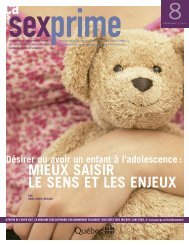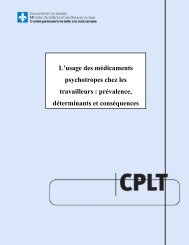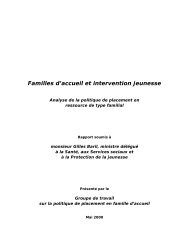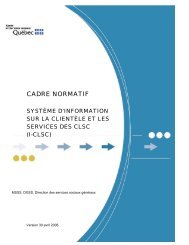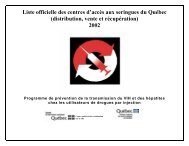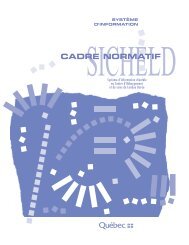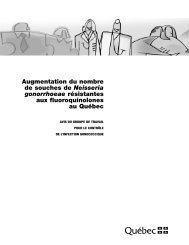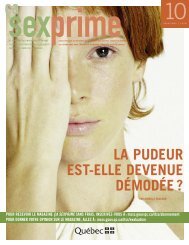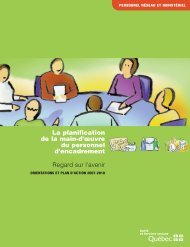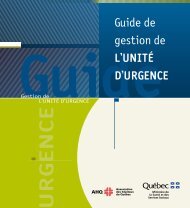De l'innovation au changement - Gouvernement du Québec
De l'innovation au changement - Gouvernement du Québec
De l'innovation au changement - Gouvernement du Québec
You also want an ePaper? Increase the reach of your titles
YUMPU automatically turns print PDFs into web optimized ePapers that Google loves.
Projet 15<br />
Quality of Outpatient Geriatric Psychiatric Consultation :<br />
do referring consultant physicians and patients agree , région de Montréal<br />
Évaluation <strong>du</strong> processus de consultation externe en psychiatrie gériatrique pour les patients âgés déprimés: perspective <strong>du</strong><br />
patient, de sa famille, <strong>du</strong> médecin référent et <strong>du</strong> médecin<br />
essential that both groups of physicians have a clear idea of the type of consultation and reason of referral.<br />
Standardized referral form well accepted and distributed;<br />
Typed consultation report.<br />
Increase availability of psychiatrist (phone) to the referring physician Simplified logistics for referrals (dealing with one secretary, one phone<br />
number, one fax number).<br />
Generally, increased teaching and support to referring physicians who tend to manage their cases for some months before referring (this<br />
was specifically true for dementia cases).Improve the communication between referring physician and the patient so that patient<br />
understands better the purpose of the referral to Psychiatry.<br />
Improved methods of information transfer, e.g. computerized.<br />
Use of nurse or other non-MD staff to assist in communicating with referring and patient/family parties.<br />
Potential implications for policy are that a shared-health care approach for mental health problems in the elderly can work only if patients<br />
cooperate with their physicians in understanding the need for referral in Psychiatry; are motivated to come to consultation; if referring and<br />
consulting physicians communicate better with a clear, shared understanding of the type of consultation and reason for referral; if<br />
consulting physicians are ready to be available in a reasonable time frame to the referring physician, and if both physician agree to<br />
upgrade their knowledge by sustained CME program. Organizational structural changes in care delivery can only work if the doctors who<br />
work within these structures (referring and consulting physicians) work together with community resources for the patient’s benefit with the<br />
support of patients and family.<br />
Such limitations highlight the need to improve mechanisms of integration of service delivery for elderly patients with psychiatric<br />
disturbances. We suggest that using a standardized referral form developed jointly by family physicians and psychiatrists could alleviate<br />
many of the problems in understanding the type of consultation and the reason for referral and would help the consultant get a better idea<br />
of the question he/she has to answer. Such a form was developed at St. Mary’s Hospital in 1996 by a multi-disciplinary committee.<br />
However, <strong>du</strong>e to a less than adequate support from the institution, knowledge about the form, availability and acceptance for use have<br />
impeded its widespread use.<br />
6.3 Avantages généralisation These obstacles that the study highlighted can certainly be transferable to other communities, especially those who have less (or no)<br />
geriatric psychiatrists for primary care physicians to refer their elderly patients to lack of communication, difficulty in availability, increased<br />
waiting time for consultation appointment would than be increased compared to the findings of this study.<br />
79



